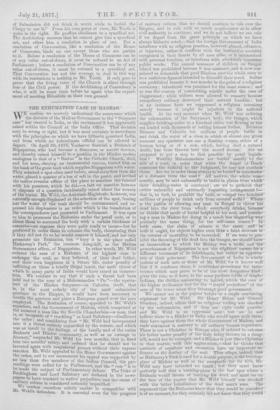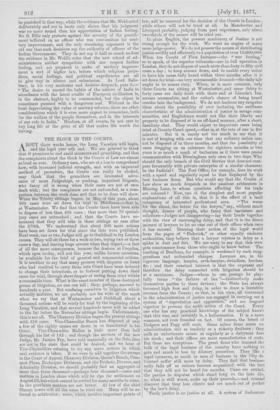THE EXHUMATION CASE IN MADRAS.
WE confess we scarcely understand the annoyance which the decision of the Madras Government in the " Sunyasee case" has created in India, or the excitement it has apparently raised within the Council at the India Office. That decision may be wrong or right, but it was most certainly in accordance with the principles on which we have hitherto governed India, and from which no subordinate official can be allowed to depart. On April 30, 1876, Voobavoo Sastrial, a Brahmin of Negapatana, who had become a Sunyasee, or ascetic devotee, and thereby raised himself to a position in the Hindoo system analogous to that of a " Beatus ' in the Catholic Church, died, and his sons, obeying an immemorial custom, buried him on the bank of the great tank which supplies Negapatam with water. They selected a spot often used before, about sixty feet from the water, placed a quarter of a ton of salt in the grave, and invited the native revenue officer of the place to sanction the funeral with his presence, which he did,—a fact we mention because it disposes of a question incidentally raised about the secrecy of the burial. Mr. Weld, the Assistant-Magistrate, however, was naturally enough displeased at the selection of the spot, fearing lest the water of the tank should be contaminated, and ex- pressed his displeasure in an order which is the foundation of the correspondence just presented to Parliament, It was open to him to prosecute the Brahmins under the penal code, or to direct them to surround the body with a certain thickness of concrete—an expense they were quite ready to incur—but he preferred to order them to exhume the body, threatening that if they did not do so he would s remove it himself, and not only prosecute the Brahmins, but "bury it in the place called Hathaway's Park," the common dung-hill, as the Madras Government affirm, of Negapatam. In other words, Mr. Weld ordered the sons of a Brahmin of the highest class to endanger the soul, as they believed, of their dead father, and their own happiness in a future life, under penalty of inflicting on them a totally illegal insult, the mefe threat of which in many parts of India would have raised an insurrec- tion. We venture to say that if .such a threat had been held out to the sons of a Mahommedan " Pir "—the equiva- lent of the IIindoo Sunyasee—in Calcutta itself, that is, in the most orderly city of the most submissive province in the Empire it would have been necessary to double the garrison and Place a European guard over the men employed. The Brahmins, of course, appealed to Mr'. Weld's superiors, and the Government of Madras, which comprised at the moment a man like Sir Neville Chamberlain—a man, that is, as incapable of " truckling " as Lord Salisbury—disallowed the order ; and considering that "Mr. Weld had incorporated into it a threat entirely unjustified by the statute and which was an insult to the feelings of the family and Of the entire Brahmin and Hindoo community, as well as an outrage to decency," suspended Mr. Weld for two months that is, fined him two months' salary, and ordered that he should not be
invested again with magisterial powers without th • eir express
sanction. Mr. Weld appealed to the HOMO Government against the order, and to our amazement his appeal was supported by no leas than five members of the Indian Council, the pre- eeedings were called for in Parliament, and the " case" is to be made the subject of Parliamentary debate. The Duke of Buckingham and Lord Salisbury are declared in the news- papers to have truckled to native prejudices, and the cause of sanitary reform is considered seriously imperilled. We confess ourselves utterly unable to sympathise with Mr. Weld's defenders. It is essential even for the progress of sanitary reform that we should continue to rule over the Empire, and to rule with so much acquiescence as to allow civil authority to continue; and we do not believe we can rule if we depart from the great principle on which we have always hitherto acted,—that the foreign Government of India interferes with no religious practice, however absurd, offensive, or injurious, unless it conflicts with the instinctive morality recognised in their hearts by all men alike, or is inconsistent with personal freedom, or interferes with absolutely necessary public works, The annual massacre of 'children on Saugor Island was prohibited because it was massacre, and is now con- sidered so detestable that good Hindoos aver the whole story lo- be a malicious figment intended to discredit their creed. Suttee was prohibited because it was murder in the guise of a religious ceremony ; infanticide was punished for the same reason ; and so was the custom of committing suicide under the cars of Juggernaut; while widows were allowed to remarry because compulsory celibacy destroyed their natural freedom ; but in no instance have we suppressed a religious ceremony merely because it might be injurious to the national health. At the very moment when Mr. Weld Was ordering the exhumation of the Sunyasee's body, the Ganges, which supplies drinking-water to a hundred cities, was flowing to the sea loaded with thousands of rotting human bodies. Between Benaros and Calcutta ten millions of people bathe- in and drink the water of a river in which at almost any given moment any spectator can see a floating corpse, either of a human being or of a cow, which, having died a natural death, hag been thrown into the sacred stream. Are we' prepared to put a stop to that practice by legisla- tion? Wealthy Mahommedans are buried usually by the side of a road, in order that when the Angel of Death summons the faithful to the Judgment, he may not overlook them. Are we toorder them always to be buried in cemeteries at a distance from the road ? All natives, the whole com- munity, may be said universally to bathe in places from which their drinking-water is conveyed ; are we to 'prohibit that' rather unhealthy and extremely disgusting arrangement thet.is, in fact, to prohibit the bath, or compel two hundred. Millions of people to drink only .from • covered wells ? Where • is the justice of allowing any man in Bengal to • throw his dead into the river from which everybody drinks, beeause he thinks that mode of burial helpful to his 'soul, and punish- ing a man in Madras for doing in a much less -disgusting way • precisely • the same thing, for the self-same reason ? In both cases, the claim of sciente is the same, and in both it ought, for objects higher even than a faint decrease hi the returha of mortality, to be overruled. If we were to pro hibit the throwing of the dead into the Ganges, we should have an insurrection to which the Mutiny- was a trifle, and the powerlessness of Negapatam is not the slightest excuse for a different treatment of its inhabitants; but rather an aggrava- tion of their grievance. The Government of India is wisely jealous of such acts as those of Mr. Weld, for it knows well that if it condones them, it establishes precedents for inter- ference which may prove to be of the most dangerous kin-a; gives the rein, as it were, to the most perilous foible of Anglo- Indians, the dislike; amounting' to hatred, which the men of the higher civilisation feel for -the "stupid prejudices" of the men of the lower when they interrupt good government. We -cannot see in the papers before us a single • convincing • argnment for Mr, Weld. Sir Henry Maine and General Strachey, indeed, affirm that no religious- feeling was shocked by the exhumation, and if • they are right cadit gewstio, and AIL weld is an oppressed man ; but we do not believe there is a Hindoo in India who would agree with them; they have against them the whole Government of Madras, and their statement is contrary to all ordinary human experience. There is not a Christian in Europe who, if ordered to exhume his father under penalty of the body being thrown on a dung- hill, would not be outraged, and a Hindoo is just like a Christian in that matter, with this aggravation,—that he thinks that methods of sepulture and cremation have an important in- fluence on the destiny of the soul, They -allege, indeed, that as Hathaway's Park is used for a double purpose, is the burning- place of Madras as well as the receptacle for its filth, Mr. Weld may have intended no insult; but they must know perfectly well that a burning-place is the last spot where a Brahmin would dream of burying his dead, and -must see on the face of the papers that Mr. Weld himself was shocked with the bitter humiliation of the dead- man's sons. The argument that the Brahmins knew that they would be punished' is of no moment, for they certainly did not know that they would be punished in that way, while the evidence that Mr. Weld acted deliberately and not in haste only shows that his judgment was no more sound than his appreciation of Indian feeling. Sir B. Ellis only protests against the severity of the punish- ment inflicted on an officer who was over-zealous for sani- tary improvement, and the only remaining argument is the old one that such decisions sap the authority of officers of the Indian Government. They do not sap it half so much as does the evidence in Mr. Weld's order that the new school of ad- ministrators neither sympathise with nor respect Indian feeling, and are prepared to make of sanitary improve- ment a sort of higher law, before which religious preju- dices, social feelings, and political expediencies are all to give way in silence and submission. As Lord Salis- bury, in his very moderate and decisive despatch, puts it,— " The desire to amend the habits of the natives of India in accordance with the latest results of European civilisation is, in the abstract, highly to be commended, but the object is sometimes pursued with a dangerous zeal. Without in the least depreciating the value of sanitary reforms, there are other considerations which it is even more urgent to remember, both for the welfare of the people themselves, and in the interests of our rule in India." Hindoos, at all events, do not care to buy long life at the price of all that makes life worth the having.































 Previous page
Previous page